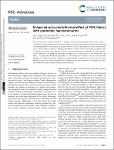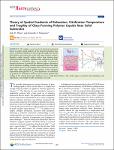Search
Author
- Quan-Hoang Vuong (27)
- Anh-Tuan Le (17)
- Vuong QH (12)
- Anh D. Phan (11)
- next >
Subject
- Electrospinning (8)
- Nanoparticles (6)
- Compound droplet (5)
- Machine learning (5)
- next >
Date issued
- 2020 - 2022 (485)
- 2010 - 2019 (19)
- 2002 - 2009 (2)
Has File(s)
Search Results
| Collection Name |
|---|
| Bài báo khoa học |
| Tạp chí khoa học |
| Tập san khoa học |
| Thiếu thông tin nhan đề |
The photothermal energy conversion in hanging and floating polyaniline (PANi)-cotton fabrics is investigated using a model based on the heat diffusion equation. Perfect absorption and anti-reflection of wet hanging PANi-cotton fabrics cause quick transfer of total incident light into water confining nearly 100% of the sunlight. As a result, a hanging membrane is found to have more attractive properties than a floating above water fabric. We find, however, that the photothermal properties of a floating PANi-cotton membrane can greatly be enhanced by dispersing TiN nanoparticles in the water below the fabric. The calculated temperature gradients for TiN nanoparticle solutions show that the absorbed energy grows with increasing the nanoparticle density and that the photothermal process... |
We employ a new force-level statistical mechanical theory to predict spatial gradients of the structural relaxation time and Tg of polymer liquids near microscopically rough and smooth hard surfaces and contrast the results with vapor interface systems. Repulsive rough (smooth) surfaces induce large slowing down (modest speeding up) of the relaxation time compared to the bulk. Nevertheless, a remarkable degree of universality of distinctive dynamical behaviors is predicted for different polymer chemistries and all interfaces, including a double exponential form of the alpha time gradient, power law decoupling of the relaxation time from its bulk value with exponential spatial variation of the exponent, exponential spatial gradient of Tg, weak dependence of normalized Tg gradients on... |
Currently, gaming is the world's favorite form of entertainment. Various studies have shown how games impact players' perceptions and behaviors, prompting opportunities for purposes beyond entertainment. This study uses Animal Crossing: New Horizons (ACNH)—a real-time life-simulation game—as a unique case study of how video games can affect humans' environmental perceptions. A dataset of 584 observations from a survey of ACNH players and the Hamiltonian MCMC technique have enabled us to explore the relationship between in-game behaviors and perceptions. Here we show a probabilistic trend towards exploiting the in-game environment despite players' perceptions, suggesting that the simplification of commercial game design may overlook opportunities to engage and educate players in pro-... |
The BNF is a joint publication of the British Medical Association and the Royal Pharmaceutical Society of Great Britain. It is published biannually under the authority of a Joint Formulary Committee which comprises representatives of the two professional bodies and of the UK Health Departments. The Dental Advisory Group oversees the preparation of advice on the drug management of dental and oral conditions; the Group includes representatives of the British Dental Association. The Nurse Prescribers’ Advisory Group advises on the content relevant to nurses. |





